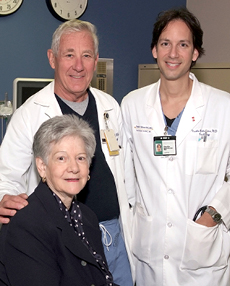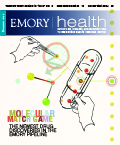An alternative to cracking the chest

With a catheter the size of the little finger, Emory physicians are healing hearts.
Emory doctors are pioneering a minimally invasive procedure to treat people with a common and potentially deadly heart condition who are too frail to undergo open heart surgery. The condition—severe aortic stenosis—is a narrowing of the aortic valve that results in restricted blood flow and immense strain on the heart. Of the 300,000 Americans who suffer from severe aortic stenosis, about a third are too frail or too ill to qualify as candidates for traditional surgery.
Emory University Hospital is one of 20 hospitals nationwide that since 2007 have studied a nonsurgical method of replacing diseased valves in such patients. As part of a phase 2 clinical trial, Emory physicians have performed transcatheter aortic valve implantations (TAVI), comparing the outcomes with traditional open heart surgery and medication therapy.
The procedure involves mounting the new valve on a catheter and inserting it either through a small incision in the groin or through the chest wall. “Both methods use a relatively thin catheter, about the size of your little finger,” says cardiologist Peter Block, who is the principal investigator (PI) of the study at Emory. “Once it is properly positioned, the new valve just moves the old one aside against the blood vessel wall and the blood can flow normally again.”
|
Cardiologist Peter Block (left) is leading a team that includes Vasilis Babaliaros (right), cardiac surgeons, and others who treat severe aortic stenosis in patients like Glenrose Gay. |
In the study, Block leads a multidisciplinary team, including fellow cardiologist Vasilis Babaliaros, who worked with the French cardiologist who implanted the first catheter-delivered valve in 2002. Working with the cardiologists are cardiac surgeons Robert Guyton (co-PI) and Vinod Thourani, as well as echocardiographers and anesthesiologists. “This procedure requires multiple areas of expertise,” says Block.
Block and his team already have performed TAVI on more than 125 patients—one of the largest patient loads in the entire clinical trial. They are now moving to the next phase of the study, which will test a slightly smaller version of the device.
The results so far have been promising. “Our trials indicate that TAVI is highly effective and saves lives,” says Block. “We’ve seen a 20% difference in mortality rate using TAVI versus standard medical therapy. Patients who had replacement heart valves delivered by catheter were more likely to survive a year than patients who were treated with standard medication therapy.”
Compared with open heart surgery, the transcatheter valve procedure takes about 90 minutes instead of the four to six hours required in surgery. Many patients report feeling improvement immediately and often can be discharged within two to three days, versus a two- to three-month recovery period for open heart surgery.
With such promising results, Block hopes the FDA will approve the procedure within the next year for patients who are not candidates for surgery. Indeed, the practice already is being used in Europe with success. “More than 20,000 patients in Europe have been treated with these types of devices,” says Block.
When TAVI does receive FDA approval, Emory will be well positioned to offer the procedure for patients. “We have the greatest experience in the Southeast, and we have one of the highest trial enrollments nationwide,” says Block.—Martha McKenzie
|
Web Connection: For more info, call 404-778-7777 or visit emoryhealthcare.org/connecting/healthconnection.html. |
||||



